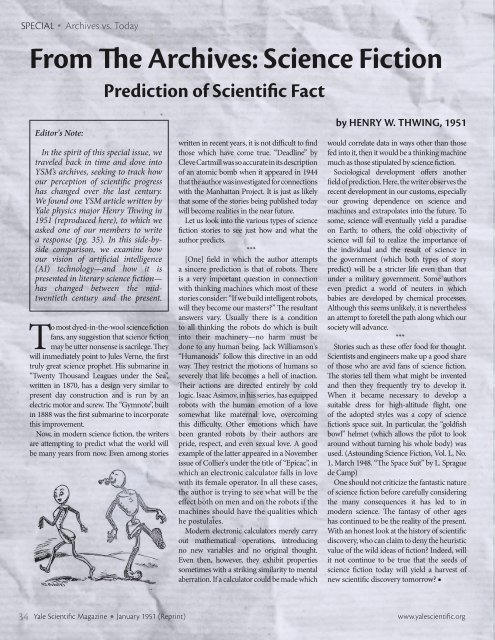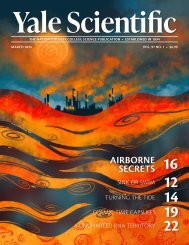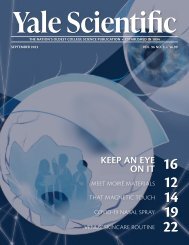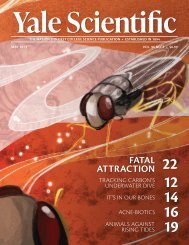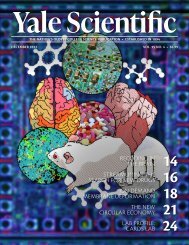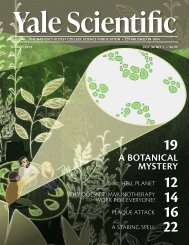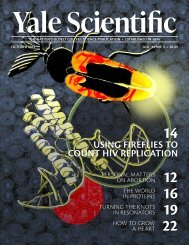YSM Issue 96.4
You also want an ePaper? Increase the reach of your titles
YUMPU automatically turns print PDFs into web optimized ePapers that Google loves.
SPECIAL<br />
Archives vs. Today<br />
From The Archives: Science Fiction<br />
Prediction of Scientific Fact<br />
Editor's Note:<br />
In the spirit of this special issue, we<br />
traveled back in time and dove into<br />
<strong>YSM</strong>’s archives, seeking to track how<br />
our perception of scientific progress<br />
has changed over the last century.<br />
We found one <strong>YSM</strong> article written by<br />
Yale physics major Henry Thwing in<br />
1951 (reproduced here), to which we<br />
asked one of our members to write<br />
a response (pg. 35). In this side-byside<br />
comparison, we examine how<br />
our vision of artificial intelligence<br />
(AI) technology—and how it is<br />
presented in literary science fiction—<br />
has changed between the midtwentieth<br />
century and the present.<br />
To most dyed-in-the-wool science fiction<br />
fans, any suggestion that science fiction<br />
may be utter nonsense is sacrilege. They<br />
will immediately point to Jules Verne, the first<br />
truly great science prophet. His submarine in<br />
“Twenty Thousand Leagues under the Sea”,<br />
written in 1870, has a design very similar to<br />
present day construction and is run by an<br />
electric motor and screw. The “Gymnote”, built<br />
in 1888 was the first submarine to incorporate<br />
this improvement.<br />
Now, in modern science fiction, the writers<br />
are attempting to predict what the world will<br />
be many years from now. Even among stories<br />
written in recent years, it is not difficult to find<br />
those which have come true. “Deadline” by<br />
Cleve Cartmill was so accurate in its description<br />
of an atomic bomb when it appeared in 1944<br />
that the author was investigated for connections<br />
with the Manhattan Project. It is just as likely<br />
that some of the stories being published today<br />
will become realities in the near future.<br />
Let us look into the various types of science<br />
fiction stories to see just how and what the<br />
author predicts.<br />
***<br />
[One] field in which the author attempts<br />
a sincere prediction is that of robots. There<br />
is a very important question in connection<br />
with thinking machines which most of these<br />
stories consider: “If we build intelligent robots,<br />
will they become our masters?” The resultant<br />
answers vary. Usually there is a condition<br />
to all thinking the robots do which is built<br />
into their machinery—no harm must be<br />
done to any human being. Jack Williamson's<br />
“Humanoids” follow this directive in an odd<br />
way. They restrict the motions of humans so<br />
severely that life becomes a hell of inaction.<br />
Their actions are directed entirely by cold<br />
logic. Isaac Asimov, in his series, has equipped<br />
robots with the human emotion of a love<br />
somewhat like maternal love, overcoming<br />
this difficulty. Other emotions which have<br />
been granted robots by their authors are<br />
pride, respect, and even sexual love. A good<br />
example of the latter appeared in a November<br />
issue of Collier's under the title of “Epicac”, in<br />
which an electronic calculator falls in love<br />
with its female operator. In all these cases,<br />
the author is trying to see what will be the<br />
effect both on men and on the robots if the<br />
machines should have the qualities which<br />
he postulates.<br />
Modern electronic calculators merely carry<br />
out mathematical operations, introducing<br />
no new variables and no original thought.<br />
Even then, however, they exhibit properties<br />
sometimes with a striking similarity to mental<br />
aberration. If a calculator could be made which<br />
by HENRY W. THWING, 1951<br />
would correlate data in ways other than those<br />
fed into it, then it would be a thinking machine<br />
much as those stipulated by science fiction.<br />
Sociological development offers another<br />
field of prediction. Here, the writer observes the<br />
recent development in our customs, especially<br />
our growing dependence on science and<br />
machines and extrapolates into the future. To<br />
some, science will eventually yield a paradise<br />
on Earth; to others, the cold objectivity of<br />
science will fail to realize the importance of<br />
the individual and the result of science in<br />
the government (which both types of story<br />
predict) will be a stricter life even than that<br />
under a military government. Some authors<br />
even predict a world of neuters in which<br />
babies are developed by chemical processes.<br />
Although this seems unlikely, it is nevertheless<br />
an attempt to foretell the path along which our<br />
society will advance.<br />
***<br />
Stories such as these offer food for thought.<br />
Scientists and engineers make up a good share<br />
of those who are avid fans of science fiction.<br />
The stories tell them what might be invented<br />
and then they frequently try to develop it.<br />
When it became necessary to develop a<br />
suitable dress for high-altitude flight, one<br />
of the adopted styles was a copy of science<br />
fiction’s space suit. In particular, the “goldfish<br />
bowl” helmet (which allows the pilot to look<br />
around without turning his whole body) was<br />
used. (Astounding Science Fiction, Vol. L, No.<br />
1, March 1948. “The Space Suit” by L. Sprague<br />
de Camp)<br />
One should not criticize the fantastic nature<br />
of science fiction before carefully considering<br />
the many consequences it has led to in<br />
modern science. The fantasy of other ages<br />
has continued to be the reality of the present.<br />
With an honest look at the history of scientific<br />
discovery, who can claim to deny the heuristic<br />
value of the wild ideas of fiction? Indeed, will<br />
it not continue to be true that the seeds of<br />
science fiction today will yield a harvest of<br />
new scientific discovery tomorrow? ■<br />
34 Yale Scientific Magazine January 1951 (Reprint) www.yalescientific.org


